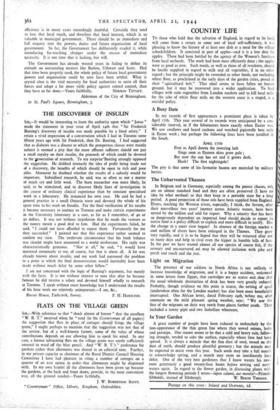THE DISCOVERER OF INSULIN
Sett,—It would be interesting to learn the authority upon which " Janus " made the statement in your issue of April 14th that " Sir Frederick Banting's discovery of insulin was made possible by a fixed salary." I retain a vivid impression of a conversation which I had in Toronto some fifteen years ago with Sir Frederick, then Dr. Banting. I had suggested that as diabetes was a disease to which the prosperous classes were mainly subject it seemed a pity that the more affluent sufferers should not pay a small royalty on their insulin, the proceeds of which could be devoted to the prosecution of research. To my surprist'Banting strongly opposed the suggestion. He disliked intensely the idea of profit being made out of a discovery, the benefits of which should be open to rich and poor alike. Moreover he doubted whether the results of a subsidy would be important. Subsidised research, he said, was as often as not a matter of much cry and little wool. The born researcher was more likely, he said, to be stimulated, and to discover likely lines of investigation in the course of ordinary clinical experience than by constant specialised work in a laboratory. He instanced his own case. He said he had a general practice in a small Ontario town and devoted the whole of his spare time to his work on Insulin. For the final verification of his results it became necessary to journey to Toronto and make certain experiments in the University laboratory at a cost, as far as I remember, of 4o or 5o dollars. It was not without trepidation that he made the venture as the money meant a good deal to him. Had the experiments failed, he said, " I could not have afforded to repeat them. Fortunately for me they succeeded." I pointed out that this experience rather seemed to confirm my view. The irrelevant circumstance that his bank balance was slender might have amounted to a world misfortune. His reply was
characteristically generous. "Not at all," he said, " it would have mattered immensely to me, of course, but that is about all. A lot was already known about insulin, and my work had narrowed the problem to a point at which the final demonstration would inevitably have been made without much delay by some other fellow."
I am not concerned with the logic of Banting's argument, but merely with the facts. It is not without interest to note that after he became famous he did receive a salary and devoted himself wholly to research at Toronto. I speak without exact knowledge but I understand the results of his later work are relatively unimportant.—I am, &c.,


























 Previous page
Previous page